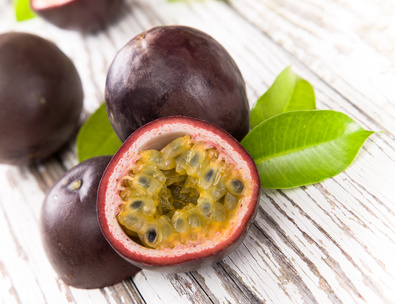by
Stepy —
April 27, 2019
- Passion fruit is a unique fruit hailing from the subtropical regions in South America.
- It is now widely available all over the world. This sweet, tart fruit is packed with nutritional value.
- Let’s take a look at the health benefits of passion fruit.
- Antioxidant rich:
- This fruit is an excellent source of antioxidants such as vitamin C and beta-carotene.
- These antioxidants protect the cells from the effects of oxidative stress.
- Dr. Andrew Weil defines oxidative stress as, “the total burden placed on organisms by the constant production of free radicals in the normal course of metabolism plus whatever other pressures the environment brings to bear (natural and artificial radiation, toxins in air, food and water; and miscellaneous sources of oxidizing activity, such as tobacco smoke).”
- Blood pressure benefits:
- Passion fruit is an excellent source of potassium, with 821 mg per cup, which is 23% of the recommended daily value. Potassium helps regulate sodium in the body, which in turn helps lower blood pressure.
- High blood pressure is a risk factor for heart attack and stroke.
- Eye health:
- Passion fruit is a great source of vitamin A and beta-carotene, two antioxidants that help prevent age-related eye disease such as macular degeneration and cataracts.
- Heart health:
- With 24.5g per cup, passion fruit is an incredible source of dietary fiber, which helps reduce LDL cholesterol (bad cholesterol). According to the American Heart Association, high LDL cholesterol is a major factor for conditions like heart disease, heart attack, and stroke. The high levels of dietary fiber along with the antioxidant content make passion fruit a great food for optimal heart health.
- Immune booster:
- One cup of passion fruit provides 70.8mg of vitamin C, which is an impressive 118% of the recommended daily value. Vitamin C is well known as a potent immune boosting antioxidant.
- Rich in iron:
- Passion fruit is a good source of iron, with 3.8mg per cup, which is 21% of the recommended daily value. Foods that are high in iron are important for transporting oxygen through the blood and protecting from iron deficiency anemia.
- For the health benefits of apples.
- For the health benefits of grapefruit.
- For the health benefits of pineapple juice.
- For the health benefits of kiwi.
- As always: Check with your health practitioner before you change your diet and see if this is right for you. This food is not meant to replace any treatment or drugs you are taking.
- REFERENCES:
- 1. “Nutrition Facts and Analysis for Passion-fruit, (granadilla), Purple, Raw.” Nutritiondata.self.com. Self Nutrition Data, n.d. Web. 08 Feb. 2014.
- 2. Weil, Andrew, MD. “Stumped by Oxidative Stress?” WEIL. Dr. Andrew Weil, n.d. Web. 08 Feb. 2014.
- 3. “Why Cholesterol Matters.” Heart.org. American Heart Association, n.d. Web. 08 Feb. 2014.


















